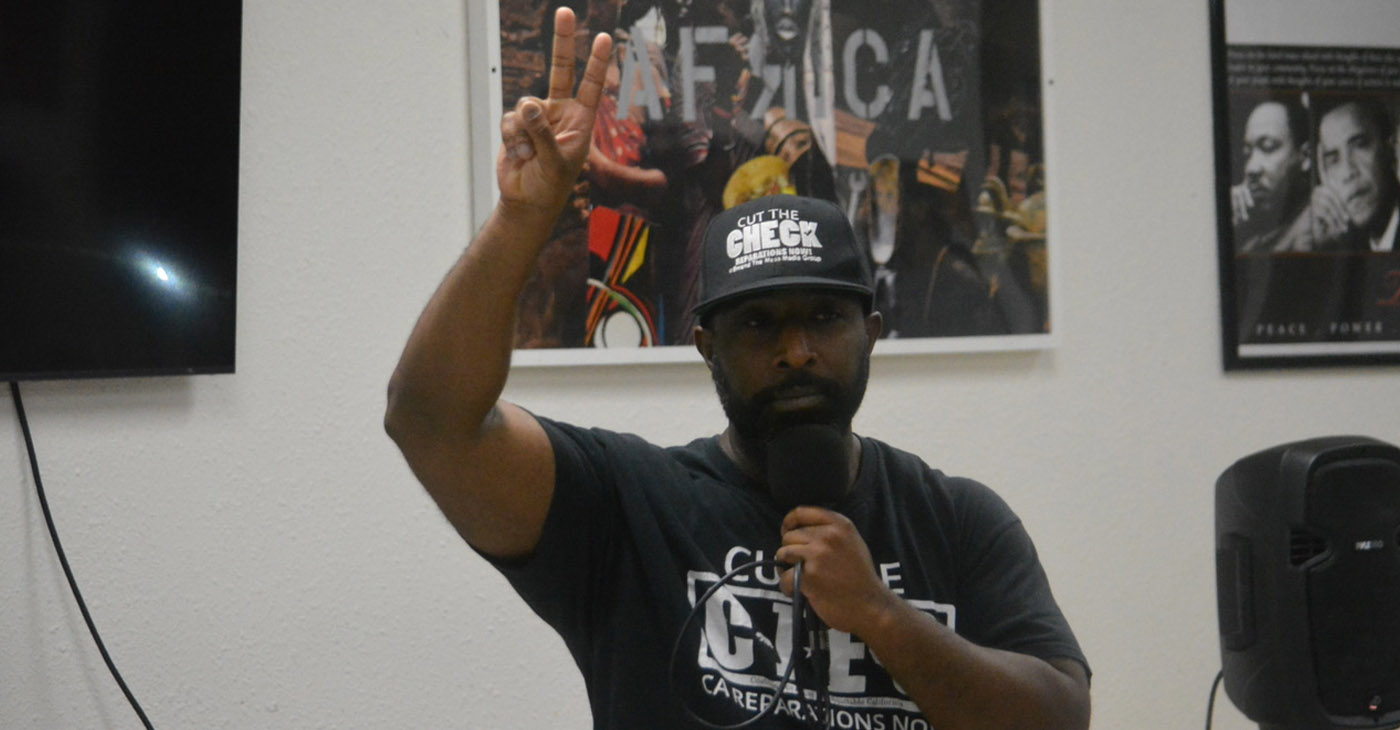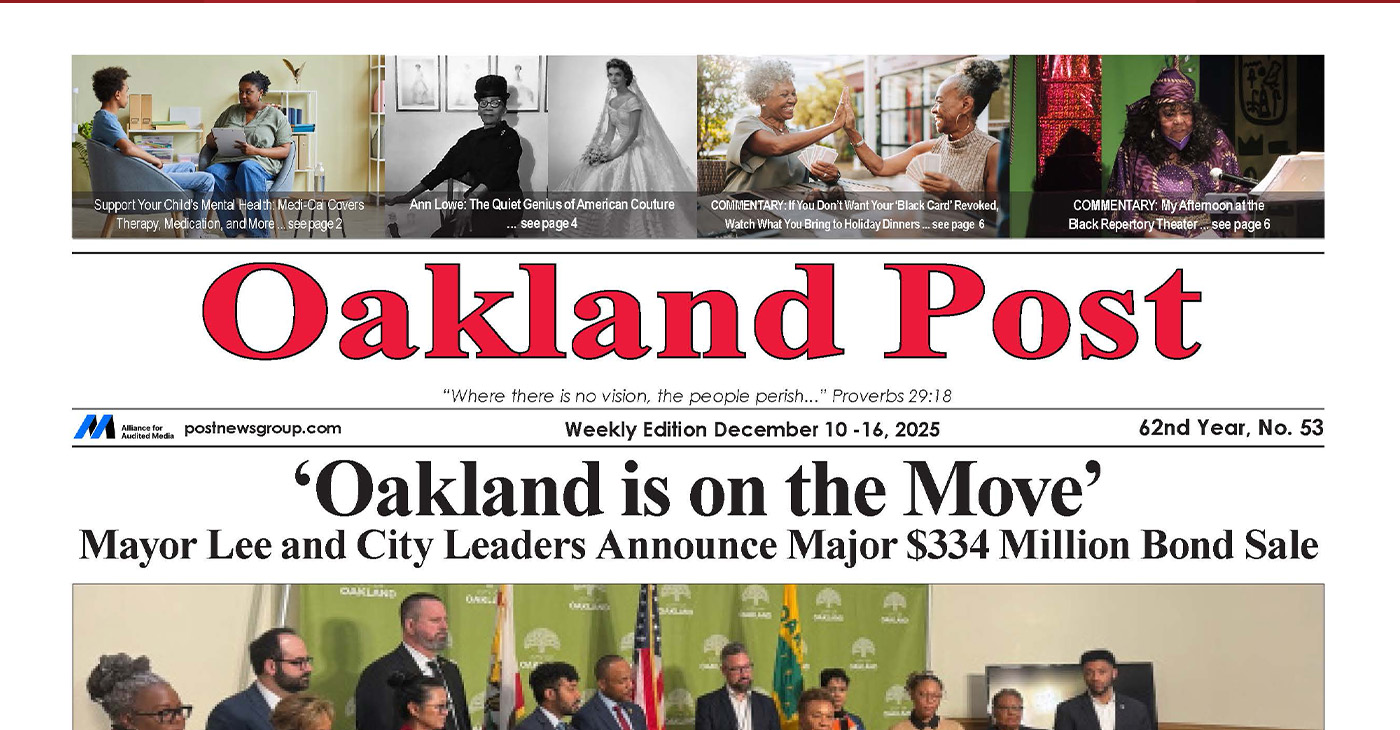California Black Media
Black Caucus Members Weigh Next Steps for Reparations in California
For more than two weeks now, members of the California Legislative Black Caucus (CLBC) have been facing sharp criticisms from frustrated advocates and other Black Californians after the State Assembly failed to bring up two reparations bills for a floor vote on Aug. 31. On Sept. 14, Assemblymembers Mia Bonta (D-Alameda), Corey Jackson (D-Moreno Valley), and Kevin McCarty (D-Sacramento) participated in the “State of Black California 2024: Listening Session Tour” in Sacramento.

By Antonio Ray Harvey, California Black Media
For more than two weeks now, members of the California Legislative Black Caucus (CLBC) have been facing sharp criticisms from frustrated advocates and other Black Californians after the State Assembly failed to bring up two reparations bills for a floor vote on Aug. 31.
On Sept. 14, Assemblymembers Mia Bonta (D-Alameda), Corey Jackson (D-Moreno Valley), and Kevin McCarty (D-Sacramento) participated in the “State of Black California 2024: Listening Session Tour” in Sacramento. During the session they heard from people who said they felt let down that the bills did not pass the Legislature and advance to Newsom’s desk for his consideration.
The three-hour event was held at the Secretary of State’s office building, one block south of the State Capitol. Amid interruptions and disruptions from the attendees during the event, Bonta said she appreciated the feedback.
“I got out of it what I expected. We have a lot of diverse thoughts and opinions about how to proceed,” Bonta told California Black Media (CBM). “It was helpful to hear directly from people without the constraints of hearing rooms and formalities. I heard a lot of frustration and concerns.”
On Sept. 12, CBLC member Sen. Lola Smallwood-Cuevas (D-Los Angeles) called in to Dominique di Prima’s radio show on KBLA 1580 AM in Los Angeles to share her perspective on reasons the CLBC did not to bring the bills to the Assembly floor. She also shared that there needs to be better communication with the community in the future.
The State of Black California Listening Session tour is a community conversation on reparations and the state of the Black community. The tour is an opportunity for the public to learn more about the 2024 legislative report that is an initiative of the University of California, Los Angeles’s Ralph J. Bunche Center for African American Studies, and the reparations package.
In collaboration with the California Black Freedom Fund (CBFF), the tour has made stops in San Diego, Santa Barbara, and Fresno. The next destinations for the Listening Session are Oakland on Sept. 28 and Moreno Valley on Oct. 5.
CBFF Executive Director Marc Philpart, who oversees the organization’s five-year-long initiative to raise and distribute $100 million, served as the moderator in Sacramento.
Philpart, who has worked closely with the CLBC and whose organization was the benefactor of $3.5 million in state funds last year, has also been under fire from advocates.
CBFF granted CBM $25,000 of that money to fund its Capitol correspondent.
The night before the State of Black California event, Philpart was questioned by Chris Lodgson, a reparations advocate and member of the Coalition for a Just and Equitable California (CJEC), about allegations that $6 million in state funds requested by the legislative Black caucus to implement reparations legislation had been designated to CBFF.
In a letter obtained by CBM and dated May 24, the CLBC requested that the state provide $6 million to assist funding efforts related to SB 1403 and direct the remaining $6 million to the CBFF. That CLBC letter stated that the money would be “utilized for community-level outreach and engagement efforts and to provide organizational support essential for the effective implementation of Reparations initiatives.”
Activism
Oakland Post: Week of December 17 – 23, 2025
The printed Weekly Edition of the Oakland Post: Week of – December 17 – 23, 2025

To enlarge your view of this issue, use the slider, magnifying glass icon or full page icon in the lower right corner of the browser window.
Activism
2025 in Review: Seven Questions for Black Women’s Think Tank Founder Kellie Todd Griffin
As the president and CEO of the California Black Women’s Collective Empowerment Institute, Griffin is on a mission to shift the narrative and outcomes for Black women and girls. She founded the nation’s first Black Women’s Think Tank, securing $5 million in state funding to fuel policy change.

By Edward Henderson
California Black Media
With more than 25 years of experience spanning public affairs, community engagement, strategy, marketing, and communications, Kellie Todd Griffin is recognized across California as a leader who mobilizes people and policy around issues that matter.
As the president and CEO of the California Black Women’s Collective Empowerment Institute, Griffin is on a mission to shift the narrative and outcomes for Black women and girls. She founded the nation’s first Black Women’s Think Tank, securing $5 million in state funding to fuel policy change.
Griffin spoke with California Black Media (CBM) about her successes and setbacks in 2025 and her hopes for 2026.
Looking back at 2025, what stands out to you as your most important achievement and why?
Our greatest achievement in this year is we got an opportunity to honor the work of 35 Black women throughout California who are trailblazing the way for the next generation of leaders.
How did your leadership, efforts and investments as president and CEO California Black Women’s Collective Empowerment Institute contribute to improving the lives of Black Californians?
We’re training the next leaders. We have been able to train 35 women over a two-year period, and we’re about to start a new cohort of another 30 women. We also have trained over 500 middle and high school girls in leadership, advocacy, and financial literacy.
What frustrated you the most over the last year?
Getting the question, “why.” Why advocate for Black women? Why invest in Black people, Black communities? It’s always constantly having to explain that, although we are aware that there are other populations that are in great need, the quality-of-life indices for Black Californians continue to decrease. Our life expectancies are decreasing. Our unhoused population is increasing. Our health outcomes remain the worst.
We’re not asking anyone to choose one group to prioritize. We are saying, though, in addition to your investments into our immigrant brothers and sisters – or our religious brothers and sisters – we are also asking you to uplift the needs of Black Californians. That way, all of us can move forward together.
What inspired you the most over the last year?
I’ve always been amazed by the joy of Black women in the midst of crisis.
That is really our secret sauce. We don’t let the current state of any issue take our joy from us. It may break us a little bit. We may get tired a little bit. But we find ways to express that – through the arts, through music, through poetry.
What is one lesson you learned in 2025 that will inform your decision-making next year?
Reset. It’s so important not to be sitting still. We have a new administration. We’re seeing data showing that Black women have the largest unemployment rate. We’ve lost so many jobs. We can have rest – we can be restful – but we have to continue the resistance.
In one word, what is the biggest challenge Black Californians faced in 2025?
Motivation.
I choose motivation because of the tiredness. What is going to motivate us to be involved in 2026?
What is the goal you want to achieve most in 2026?
I want to get Black Californians in spaces and places of power and influence – as well as opportunities to thrive economically, socially, and physically.
Activism
Oakland Post: Week of December 10 – 16, 2025
The printed Weekly Edition of the Oakland Post: Week of – December 10 – 16, 2025

To enlarge your view of this issue, use the slider, magnifying glass icon or full page icon in the lower right corner of the browser window.
-

 #NNPA BlackPress3 weeks ago
#NNPA BlackPress3 weeks agoLIHEAP Funds Released After Weeks of Delay as States and the District Rush to Protect Households from the Cold
-

 Alameda County3 weeks ago
Alameda County3 weeks agoSeth Curry Makes Impressive Debut with the Golden State Warriors
-

 Activism4 weeks ago
Activism4 weeks agoOakland Post: Week of November 26 – December 2, 2025
-

 #NNPA BlackPress3 weeks ago
#NNPA BlackPress3 weeks agoSeven Steps to Help Your Child Build Meaningful Connections
-

 #NNPA BlackPress3 weeks ago
#NNPA BlackPress3 weeks agoSeven Steps to Help Your Child Build Meaningful Connections
-

 #NNPA BlackPress4 weeks ago
#NNPA BlackPress4 weeks agoTrinidad and Tobago – Prime Minister Confirms U.S. Marines Working on Tobago Radar System
-

 #NNPA BlackPress4 weeks ago
#NNPA BlackPress4 weeks agoThanksgiving Celebrated Across the Tri-State
-

 #NNPA BlackPress3 weeks ago
#NNPA BlackPress3 weeks agoTeens Reject Today’s News as Trump Intensifies His Assault on the Press
























































